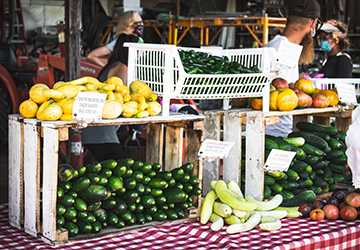The farm-to-table movement is more than just a trend; it's a commitment to healthier and more sustainable eating. This approach emphasizes directly sourcing ingredients from local farms to the table, ensuring diners enjoy the freshest possible produce. One of the main benefits of farm-to-table is the guarantee of fresh, nutrient-rich foods that are often organic and free from harmful pesticides. Farm-to-table restaurants have become beacons in this movement, showcasing how fresh ingredients can elevate a dining experience.
A significant aspect of the farm-to-table concept is its positive impact on local communities and the environment. By sourcing ingredients locally, farm-to-table restaurants reduce the carbon footprint associated with long-distance food transportation. Additionally, these farm-fresh dining experiences support local farmers and producers, fostering a sense of community and sustainability. The benefits of farm-to-table are thus twofold: they promote eco-friendly practices and contribute to the local economy.

Farm-to-table restaurants are at the forefront of a culinary revolution, offering menus that change with the seasons and reflect the freshest produce available. This aspect of farm-fresh dining experiences ensures that guests are treated to unique and flavorful dishes that can't be replicated in conventional restaurants. The chefs in these establishments often collaborate closely with local farmers, tailoring their menus based on what's available and in season, thereby maximizing the benefits of farm-to-table dining.
Another key feature of the farm-to-table movement is its educational value. Farm-to-table restaurants often engage their customers in the story behind their food, from how it's grown to its journey to the table. This transparency builds trust and enhances the overall farm fresh dining experience. Patrons leave with a greater appreciation of their food's origins and the labour that goes into sustainable farming, further solidifying the benefits of farm-to-table practices.
The farm-to-table movement is a growing trend in the culinary world. As more people become conscious of their food choices, the demand for farm-fresh dining experiences continues to rise. This shift is a testament to the increasing awareness of the health, environmental, and community benefits of farm-to-table. This movement will become a fundamental aspect of the culinary scene in the coming years, shaping how we think about and enjoy our food.
The ethos of the farm-to-table movement lies deeply rooted in sustainable agriculture. This approach not only advocates for the freshest produce but also supports farming methods that are environmentally friendly and ethical. By choosing farm-to-table restaurants, diners indirectly contribute to sustainable practices like crop rotation, organic farming, and reducing chemical fertilizers. These farm-fresh dining experiences thus testify to a diner's commitment to environmental stewardship.
An integral benefit of farm-to-table is its positive impact on local economies. By sourcing ingredients from nearby farms and producers, these restaurants help circulate money within the community, providing financial support to local farmers and artisans. This economic model fosters local entrepreneurship and creates a tighter-knit community, reinforcing the social aspect of farm fresh dining experiences.

Health is at the forefront of the farm-to-table philosophy. When restaurants procure their ingredients from the farm, they often get products at their peak nutritional value. Fresh, unprocessed, and often organic, these ingredients provide diners with meals rich in nutrients and free from additives. Farm-to-table benefits extend beyond just taste; they include the peace of mind that comes with consuming food that is good for the body.
Farm-to-table restaurants are not just dining venues; they are educational hubs that enlighten customers about where their food comes from and how it is grown. This education extends to learning about different varieties of produce, heirloom species, and traditional cultivation methods. Such farm-fresh dining experiences often inspire customers to make more informed food choices outside the restaurant.
One of the charms of farm-to-table restaurants is their ever-changing menus that align with the seasons. This adherence to seasonal produce ensures diners experience something new and exciting while also getting an authentic taste of the region's seasonal bounty. Chefs in these establishments often craft based on what is currently available, making each farm's fresh dining experience unique and reflective of the earth's natural cycles.
Farm-to-table is redefining the culinary industry, emphasising freshness, sustainability, and community support. This movement goes beyond mere dining; it's about embracing a lifestyle that values health, the environment, and local economies. As farm-to-table restaurants continue to grow in popularity, they pave the way for a future where every meal celebrates flavour and freshness.
Answer: The primary benefits of farm-to-table dining include access to fresher, more nutritious food, support for local farmers and economies, and a reduced environmental impact. Freshness is critical in these settings, as the shorter time between harvest and your table means food retains more of its nutritional value. Supporting local agriculture also strengthens community ties and contributes to sustainable farming practices. Plus, less transportation means a smaller carbon footprint, making farm-to-table restaurants a more environmentally conscious choice.
Answer: Farm-to-table restaurants ensure year-round freshness by adapting their menus to the seasonal availability of produce. By building close relationships with local farmers, chefs can plan their menus around what's currently in season, ensuring that the ingredients are fresh and at their peak flavour. In some cases, restaurants also use preserved or greenhouse-grown produce to maintain a supply of fresh ingredients outside the traditional growing season, enhancing the farm-fresh dining experience all year round.